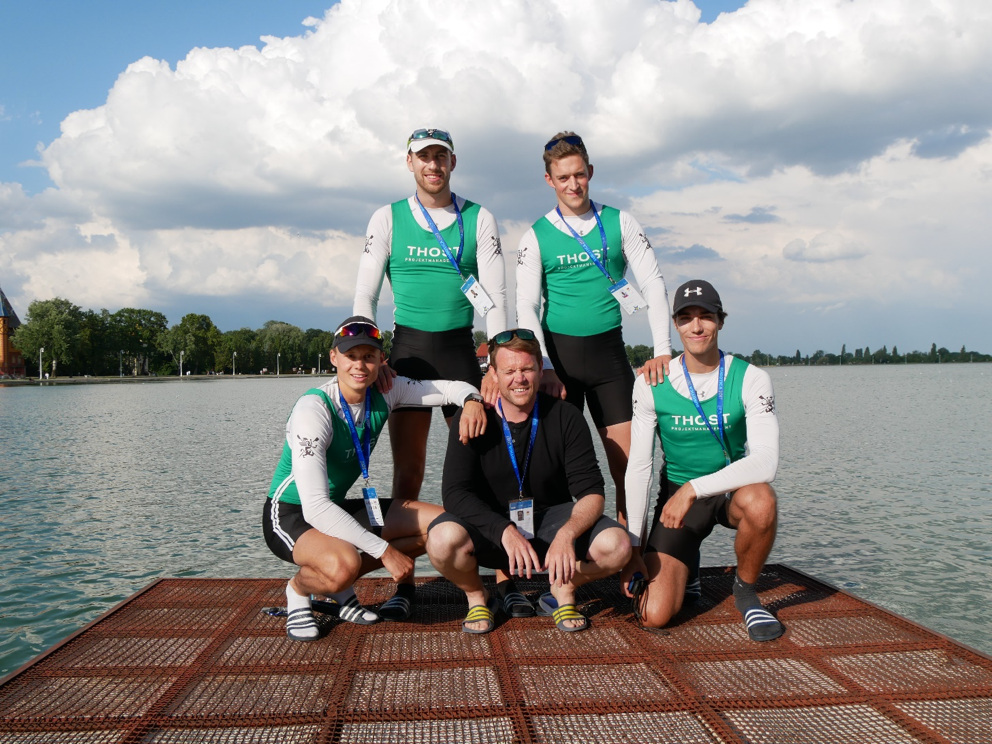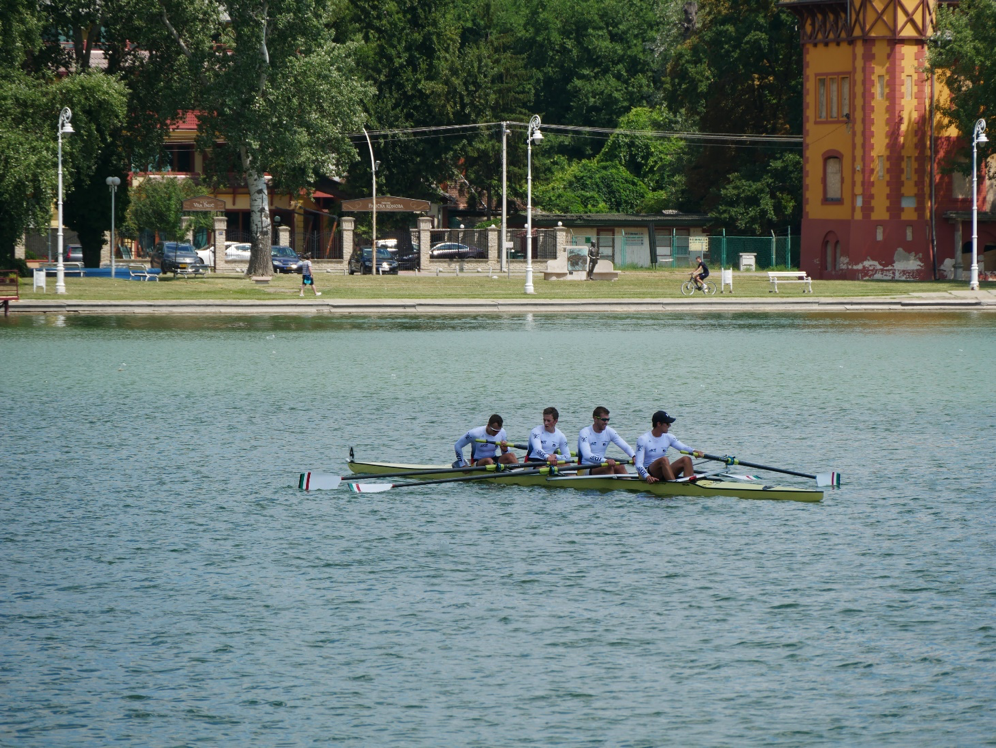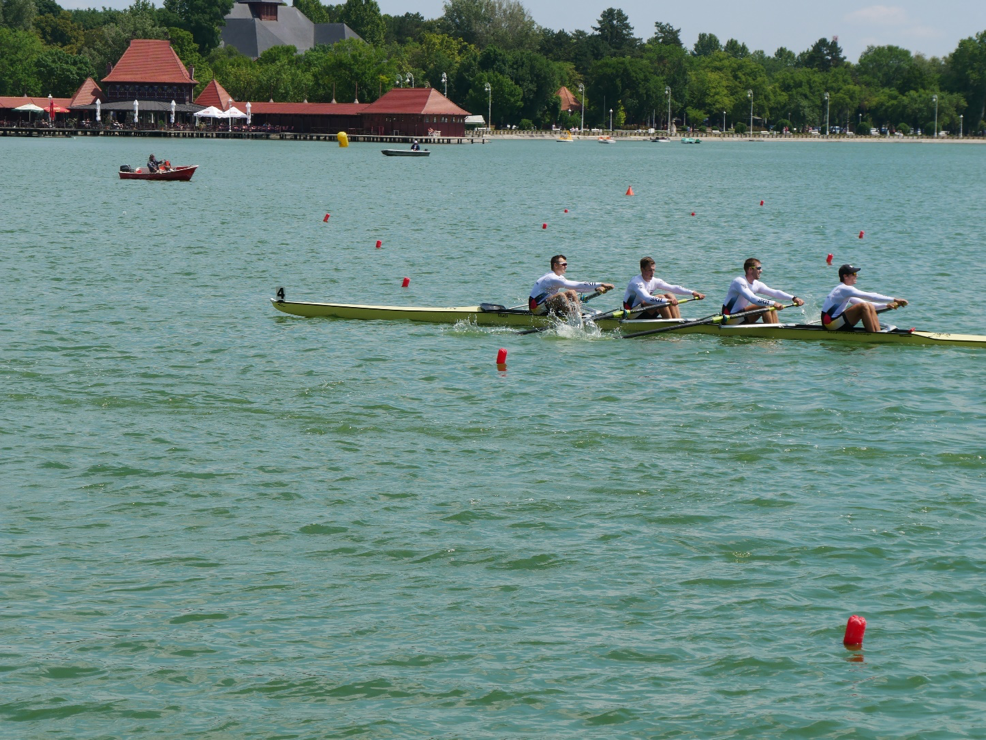European University Championships in Subotica

In addition to crews from all over Germany and Europe, four students from Karlsruhe were also represented at the tournament. Simon Gessler, a student at Karlsruhe University of Applied Sciences, as well as Maximilian Schäfer, Andreas von Borstel and Rupert Pretzler - all three students at the Karlsruhe Institute of Technology - won the silver medal for Karlsruhe in the men's coxless four.
Three of the four team members - Rupert Pretzler was new to the team this year - were already very successful last year. The Karlsruhe four is the reigning European university champion. The boat won this title last year in Zagreb at the European University Games. The boat qualified for this year's European Championships by winning the foursome at the German University Championships in Bremen last July.
The four had traveled to Serbia this year with the hope of defending their title.
The competition began for the Karlsruhe boat with a course distribution race on Friday. If there are fewer than 6 registered boats (5 nations were represented in the four), there are no preliminary heats and the boats only row for the distribution of lanes in the final. As a rule, there is a lot of tactics involved here and the forces are managed for the final race. This is also how the four students from Karlsruhe started the first race. The aim was to achieve a good position in order to row in one of the middle lanes in the final. The Karlsruhe team did just that, finishing second behind Oxford in the lane allocation race. A good starting position for the final on Sunday.
On Sunday, the men's four was decided at lunchtime. Despite very difficult conditions (strong headwind and waves), the German boat initially got off to a good start. When the first intermediate sprint started shortly after the 500 meter mark, the entire field was still very close together.
During the middle 1000 meters of the 2000 meter (=Olympic race distance) race, however, the field became increasingly equalized. Oxford took the lead and controlled the action from then on. Despite numerous well-functioning intermediate spurts and a spirited final spurt that pushed all four Karlsruhe team members to the limit of exhaustion, the German boat was unable to come dangerously close to the Oxford foursome again. The other opponents from Claude Bernard University in Lyon, France, the University of Savoy Mont Blanc, also in France, and the University of Aalborg in Denmark, on the other hand, were easily controlled by the students from Karlsruhe. The result behind the finish line was therefore: gold for Oxford, silver for Karlsruhe and bronze for the four from Lyon.
"The boat from Oxford was simply too strong, we tried to keep up with them after the start and stayed with them for a long time. Unfortunately, they were then in front and immediately countered all our spurts and controlled the race so that we couldn't do anything in the end." Said Maximilian Schäfer.
Despite their initial disappointment at not being able to repeat last year's great result, the four from Karlsruhe were more than satisfied with their second place behind the rowers from Oxford Brookes University and ahead of the four from the University of Lyon in France.
"The boys are the second-fastest university four in Europe and can be very proud of their performance. It's a shame that it wasn't enough to defend the title. But they did a great race and I think that the four of them gave everything they had technically and physically in the final," explained coach Christoph Reichelt after the race.
After a more physically oriented basic training over the winter and spring with many training sessions in the weight room and on the rowing ergometer, the four Karlsruhe students have intensified their training in the boat once again in the last few weeks and months in view of the upcoming highlight of the season. They regularly trained together up to 10 times a week under the watchful eye of coach Christoph Reichelt in the Rhine harbor and at training camps abroad in order to fine-tune their technique and achieve the necessary competitive toughness through training loads in the boat.
We would like to thank the university sports department of the Karlsruhe Institute of Technology, the Karlsruhe rowing club Wiking, our sponsors THOST Projektmanagment and Agosi and our coach Christoph Reichelt for their great support.


